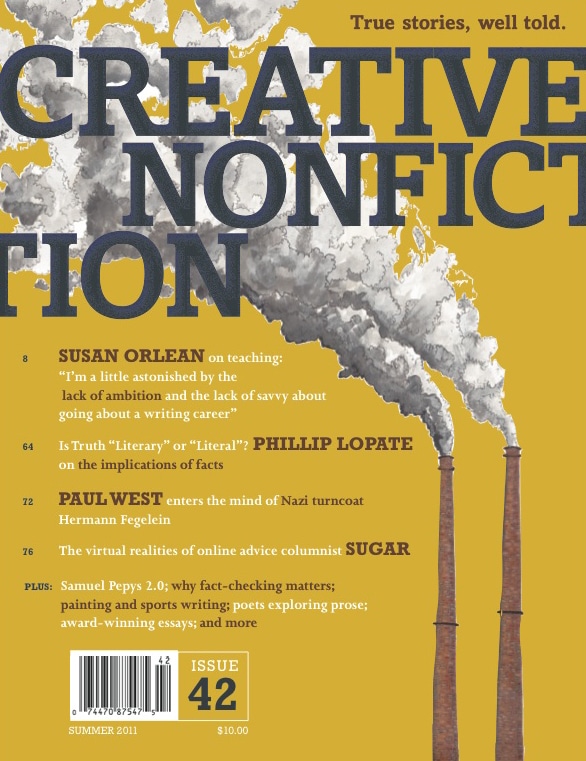Issue 42 / Summer 2011

42 / Unthemed
Packed with prize-winning work
Issue #42 is packed with prize-winning work: winning essays from CNF and Salt’s “The Night” contest, CNF’s MFA Program-Off, and the Norman Mailer College Writing contest.
Plus, Phillip Lopate and Lee Gutkind grapple with the implications of facts; Pulitzer Prize-winner Ira Berkow finds inspiration in the art world; Paul West enters the mind of Nazi turncoat Hermann Fegelein in a new Pushing the Boundaries selection; Susan Orlean talks about teaching young writers; and more.
Already a subscriber?
Read this issue nowTable of Contents
What’s the Story #42
For nearly a half-dozen years in the 1980s, I carried a beeper, wore blue surgical scrubs and soared through the night in Learjets while immersing myself in the world of organ transplantation at the University of Pittsburgh for a book I was writing.The 17th century’s most famous diarist finds new life on Twitter
A writer opens her inbox to a 350-year-old quote by Samuel PepysENCOUNTER: Susan Orlean
A conversation about CNF and teaching between Lee Gutkind and Susan Orleanfor(e)closure
I want to say I am an expert on foreclosure—I feel an onus to provide a sturdy framework for what follows, to be more well-read on the subject than most—but even reviewing the titles of books chronicling the mortgage crisis and foreclosure is overwhelming.My Night with Ellen Hutchinson
Most of them took place at night—the battles we sometimes lost but always survived. It’s not that we wanted to be up all night or that we could breathe easier once the sun came up and the outcome seemed inevitable; we simply had no control over when the phone rang.Extinction
For any particular organism that once existed, the probabilitythat it today is part of the fossil record is infinitesimally small. A fundamental difficulty with extinction is that it is impossible to prove a negative—the absence of a species—and, therefore, to be sure exactly when extinction occurred.Suffering Self
In November of 1988—eight years after he had failed his escape attempt by boat, was captured, was imprisoned, ran away, was recaptured while smoking a cigarette, was imprisoned again, dug hundreds of thousands of spoons of dirt, did not dig quickly enough, had his ankles chained to the prison cell, finally escaped with the help of a Northern soldier and had arrest warrants posted on him, and five years after he had settled in Da Lat in his mother’s house, had begun to consider himself safe from his past, had met my mother, married her and had three children—my father was talking with his uncle, who typed American papers and documents for clients.The Skeleton Woman
“Tell them I am going to show them what they are,” said my mother while dropping me off at primary school. She’d agreed to come to Parent Show and Tell Day, and we had to report to the teacher what our visiting parents would be talking about.Fact-Checking: the devil’s in the details
We recently received a letter from an annoyed reader who discovered a factual error in an essay Creative Nonfiction published.Nonfiction may be a construct, but does that make it fiction?
We’re sorry; we’re currently unable to make this work available online.A Different Kind of Truth
As a poet new to nonfiction, I often found it difficult to flesh out a narrative fully in prose. After conditioning my poetic eye to look for words to cut—those pesky, extraneous articles and conjunctions—I suddenly found myself looking for places where words were missing, where more words were needed.Art and the sportswriter
Indeed, poets writing creative nonfiction have to learn a great many things; we have to learn how to breathe all over again. And while we encourage young poets to stray from the truth when writing, this is not because we are looking for fiction but because we want them to seek out the larger truth in the moment being described.Herman Fegelein: Getting Out of Dodge
According to the poet Gottfried Benn, to delve deep into yourself entitles you to something called “the domestic form of emigration.”You go abroad without leaving home. So, then, being shot by the Führer’s armed guards surely entitles you to the same exemption.What We’re Hungry For
In February of 2010, an e-mail popped into my in-box. It was from a friend and fellow writer who had a proposition for me: Would I like to take over an anonymous online advice column called "Dear Sugar", which had been running intermittently over the past year on a Web site called The Rumpus?File Not Found
We’re sorry; we’re currently unable to make this work available online.Susan Orlean
A discussion about CNF and teaching between Lee Gutkind and Susan Orlean
